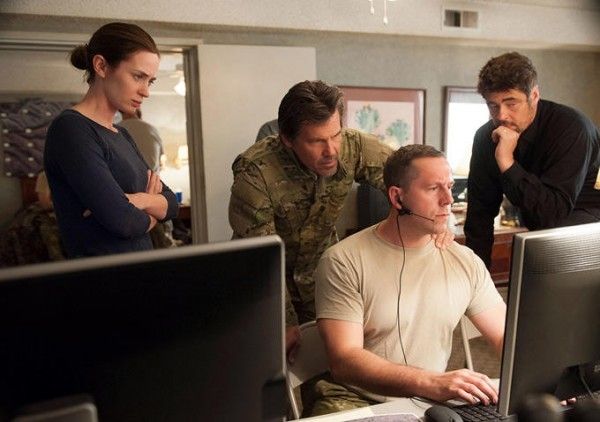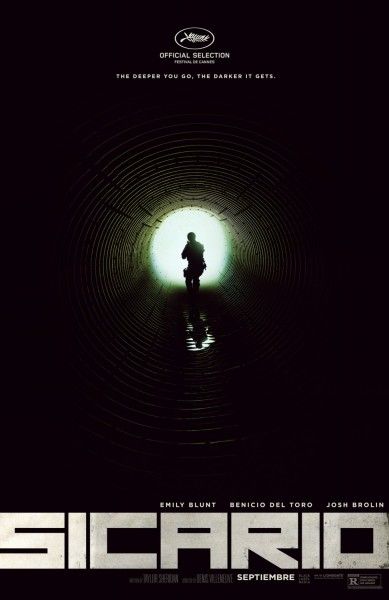After the Oscar-nominated Incendies and his habitual auteur films (Enemy, Prisoners), Denis Villeneuve forays into more mainstream cinema with the Michael Mann-esque Sicario, a thriller exploring the escalating war on drugs whose battleground is often the Tex-Mex border. Villeneuve seems relieved that the notorious Cannes critics liked the movie. “Cannes has the reputation of being difficult. We heard 15 minutes after the screening ended that the reactions were very positive.”
Benicio Del Toro, winner of the best actor Palme in 2008 for Che, garnered the most applause as his name flashed in the closing credits. It is indeed he and Josh Brolin who carry the film. (One journalist at the press conference following the screening even mistook him for Brolin’s co-star in No Country For Old Men. “I wasn’t in that movie, but thank you, that’s a compliment,” was Del Toro’s response.)
Sicario appears to be new territory for Villeneuve. “I'm a very, very small screenwriter and my appetite for cinema is huge right now. I read a lot of scripts in the past year, but I fell in love with this one. I was really interested for the past few years in that specific place, the border between America and Mexico.”
Villeneuve sets the bar high with the opening scene. As a man, no doubt a sicario— hitman in Mexican slang— is watching television in a bare, seemingly unkempt house somewhere in Arizona, the specks of dust dancing in the beam of the afternoon sunlight pouring through the window, like a foreboding spotlight. An armored vehicle crashes through the house, FBI agents pour out, led by Kate Mercer (Emily Blunt). After she narrowly escapes death, they discover that the hole in the wall pierced by the bullet that was meant for her hides a secret grave. In fact, the walls of the house are entirely filled with decaying corpses in plastic bags. It is a gruesome, action-packed opener that leads the story to penetrate the U.S. government’s war on the drug cartels of Mexico.
Soon after, Kate is enlisted to be part of an elite government task force, overseen by gum-chewing operative Matt Graver, played by Brolin, who brings some lightness to the story. He’s the one with the smartass one-liners. “My job in the movie is to be as anti-profound as possible,” Brolin said of his role.
Kate accepts to “volunteer” but realizes she is not being told what the mission really consists of as they board a private jet to Mexico with another travel companion, Alejandro (Del Toro), a mysterious agent whose spasmodic sleeping pattern indicates a tragic past.
What follows is a pivotal moment for Kate. As they cross the border into Mexico and back in a brilliantly choreographed scene, they also cross lines that will make her question the ethics of this mission.
Sicario seeks to explore how the war on drugs is carried out. When the long arm of the law is cut off, is it morally and ethically justified to fight dirty? And more importantly, do the means justify the end? It’s all or nothing for Alejandro, as Benicio Del Toro said at the press conference: “Denis was saying something that's kind of new through my character. Well, new to me that I haven't played: revenge, the end justifies the means. Denis pushed me to take the chance and go further out, which in the story is all or nothing.”
This film is not Traffic, but Del Toro is all too familiar with the terrain. “I've done many movies that deal with that part of the world and I'm very sensitive to that part of the world… Denis was sensitive. Like I said, I'm an old voice that deals with the problem. Denis, being new to that problem, came understanding it fully.” Did he? Denis seems overly ambitious at times. Somehow, he and screenwriter Taylor Sheridan seem to think they have invented a new angle in the drug cartel genre. “I think we are living in a period of time where the gray zone is more blurred than ever,” Villeneuve explained.
While Sicario is a good, even very good, thriller with the added touch of Roger Deakins’ pristine cinematography, it also has its shortcomings. The writer’s desire to go into those designated gray areas of the lawless Mexican-American border (the country for no men?) often leaves the story floating in murky waters of an auteur film crossed with genre cinema. But the grayest area seems to be Kate.
She struggles with the ethical breaches and her moral conscience drives her to contest them, oftentimes expressing her desire to leave the mission. Blunt’s lines focus mainly on her moral conscience and she spends much of the movie wearing the same worried expression. And T-shirt. Kate’s wardrobe consists of one asexual tee, messy hair in a bun and a non-lacy bra, suggesting the lack of a sex life. While I don’t expect her to be in full make-up and heels, the image of the female agent out of touch with her femininity reminds me of Miss Congeniality, minus the beauty pageant. There is a lack of dimension to her, and it is not an issue with the acting but rather how the role has been written, rendering her generic and insignificant. And perhaps she was written that way because, as Villeneuve says, a female lead in a movie about drug wars is intimidating. “It was a screenplay that people are afraid of because of the female character.”
Blunt delivers Kate’s vulnerability and disorientation, but for a lead role she falls rather flat. Unlike Jessica Chastain’s Maya in Zero Dark Thirty, the character is underdeveloped and does not own the story; rather, the story swallows her up and we just can’t seem to focalize on the character. Just when she is about to take form, she recedes back into irrelevancy.
The ultimate the question remains: do the means really justify the end?
Unlike his character, Del Toro prefers doing things by the book. “Me, personally, I don't believe like my character does. I believe justice should be made by law and order.”




